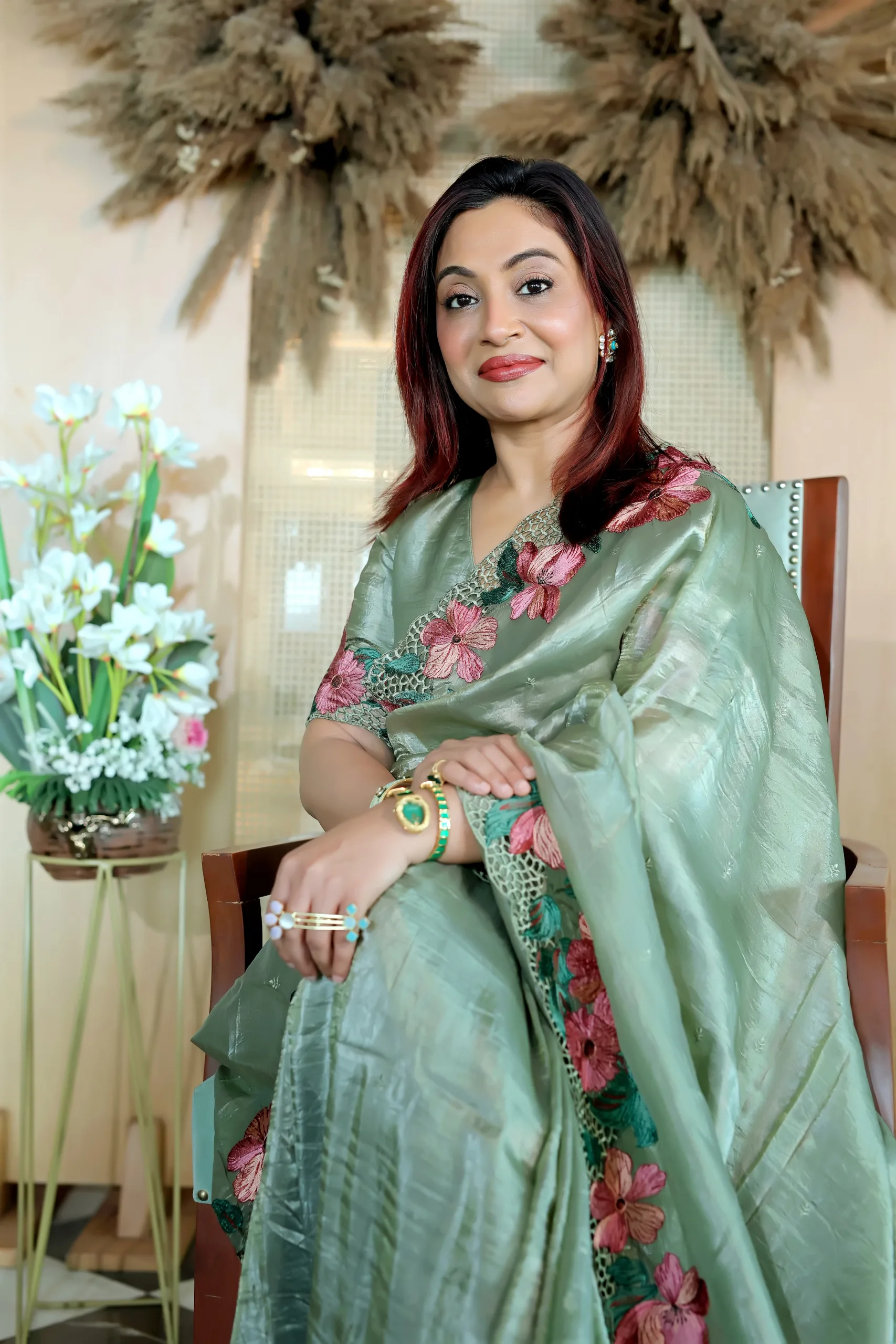Dr. Rennie Joyy is the founder of Aalekh Foundation, a non-profit organisation established in 2015 in India with a mission to empower women, children, and youth. The foundation operates across diverse sectors, including education, vocational training, healthcare, youth skilling, and environmental sustainability.
Aalekh Foundation is also deeply committed to the promotion of Indian heritage, cultural preservation, and climate change advocacy—fostering a meaningful connection between India’s rich traditions and the evolving needs of modern society. Among its flagship initiatives is Anant Samagam, a first-of-its-kind cultural confluence that celebrates the vibrant heritage of India’s Northeast and Kerala, seamlessly blending arts, tradition, and sustainability.

1. Could you share a bit about your background and what motivated you to transition from a career in law and banking to founding a non-profit organisation?
My journey has spanned senior leadership roles in multinational banks and now continues in the legal profession. While my corporate and legal experience equipped me with insight, structure, and the ability to navigate complex systems, I’ve always felt a deep pull toward creating a more grounded, community-driven impact.
Aalekh Foundation was born from that impulse—as a CSR initiative rooted in the desire to give back in a meaningful and lasting way.
Over time, I witnessed two significant gaps: the growing disconnect between our youth and their cultural roots, and the lack of accessible, sustainable opportunities for women to become self-reliant. Addressing these dual needs—empowering women and youth while preserving our cultural heritage—became the heart of Aalekh’s mission.
2. What were some of the challenges you faced during the initial days of the Aalekh Foundation?
Transitioning from a corporate to a community-centric space involved a significant shift in mindset. One of the earliest challenges was building trust and credibility in the non-profit sector. Resources were limited, and identifying the right people and communities to collaborate with required time and sensitivity.
Another major challenge was repositioning culture and heritage. It was important to move the narrative beyond treating them as luxuries, and instead highlight them as vital resources—sources of identity, direction, and potential livelihoods, especially for young people and women.
3. What is the core mission of Aalekh Foundation, and how do you work towards achieving it?
Aalekh Foundation’s core mission is to empower women and youth through the preservation of culture and heritage, while integrating sustainability and environmental consciousness.
We believe that culture is not just something to be archived—it is something to live, celebrate, and build livelihoods around. To that end, we conduct heritage walks, document traditional knowledge systems, mentor artisans, and engage youth through creative storytelling.
Our work also includes skill development workshops, training programs, and community-based sustainability projects, all grounded in climate-conscious practices.
4. What are some of the innovative strategies you’ve implemented to ensure the sustainability of the foundation’s projects?
We’ve adopted several key strategies:
- Livelihood-driven models: We promote cultural entrepreneurship, particularly among women and youth, to turn heritage into sustainable income.
- Community ownership: We ensure that our initiatives are organically sustained by involving local communities from the ground up.
- Climate sensitivity: We recognise the urgency of climate change and integrate eco-friendly practices across all our programs.
- Multi-sector collaborations: We actively engage with corporates through CSR partnerships, and with academic and cultural institutions to establish long-term impact models.
5. What are the future plans for Aalekh Foundation in terms of expansion or new initiatives?
We’re currently focused on expanding our cultural programming, particularly through the Anant Samagam initiative. The first edition, held in Delhi in October 2024, brought together diverse cultural expressions from regions like the Northeast and Kerala. The overwhelming response has encouraged us to take Anant Samagam to other parts of India—and eventually overseas—showcasing the interconnectivity and vibrancy of India’s cultural heritage.
We’re also planning new editions that explore equally rich but lesser-known cultural landscapes.
Another key focus is integrating AI-driven vocational training to empower youth with modern career pathways while ensuring cultural sensitivity remains central.
In parallel, we’re strengthening our environmental efforts to ensure sustainability and climate awareness remain integral to everything we do.
6. What advice would you give to someone looking to start their own non-profit organisation?
Start with clarity and courage. The non-profit path is one of heart-led leadership. Blend passion with strategy. Progress may be slow, but meaningful change takes time.
Focus on building trust, creating value, and making your work community-owned. And never underestimate the transformative power of heritage and sustainability—they’re not just cultural assets, but catalysts for empowerment.
How can people be part of the Aalekh journey?
There are many meaningful ways to contribute:
- Volunteer your time, skills, or ideas—whether in cultural research, legal aid, storytelling, or sustainability.
- Partner with us through CSR collaborations in women’s empowerment, youth leadership, or climate action.
- Sponsor programs or fellowships for under-resourced communities.
- Join our events, heritage walks, or online campaigns—because even raising awareness is a powerful contribution.
At Aalekh, we believe in collective custodianship. Every individual plays a part in preserving the past, shaping the present, and securing a sustainable future.



